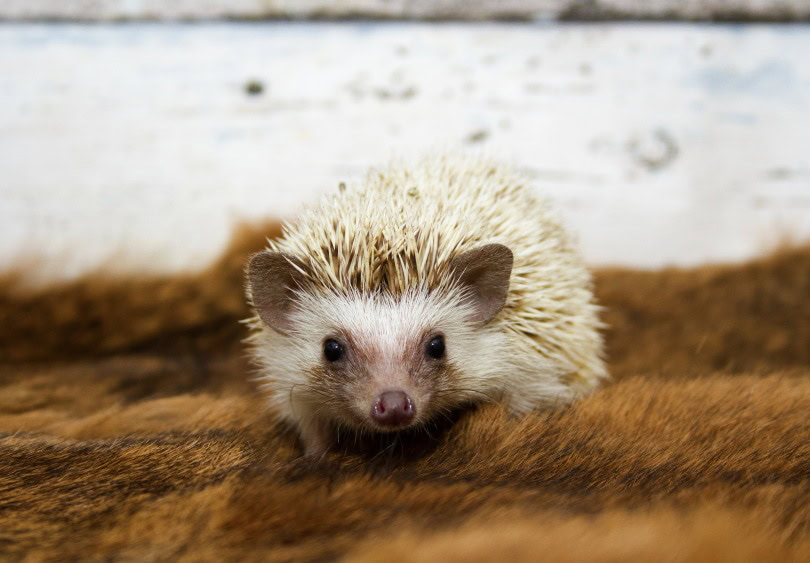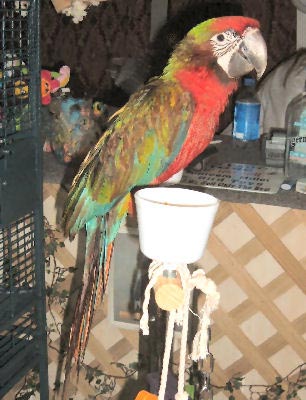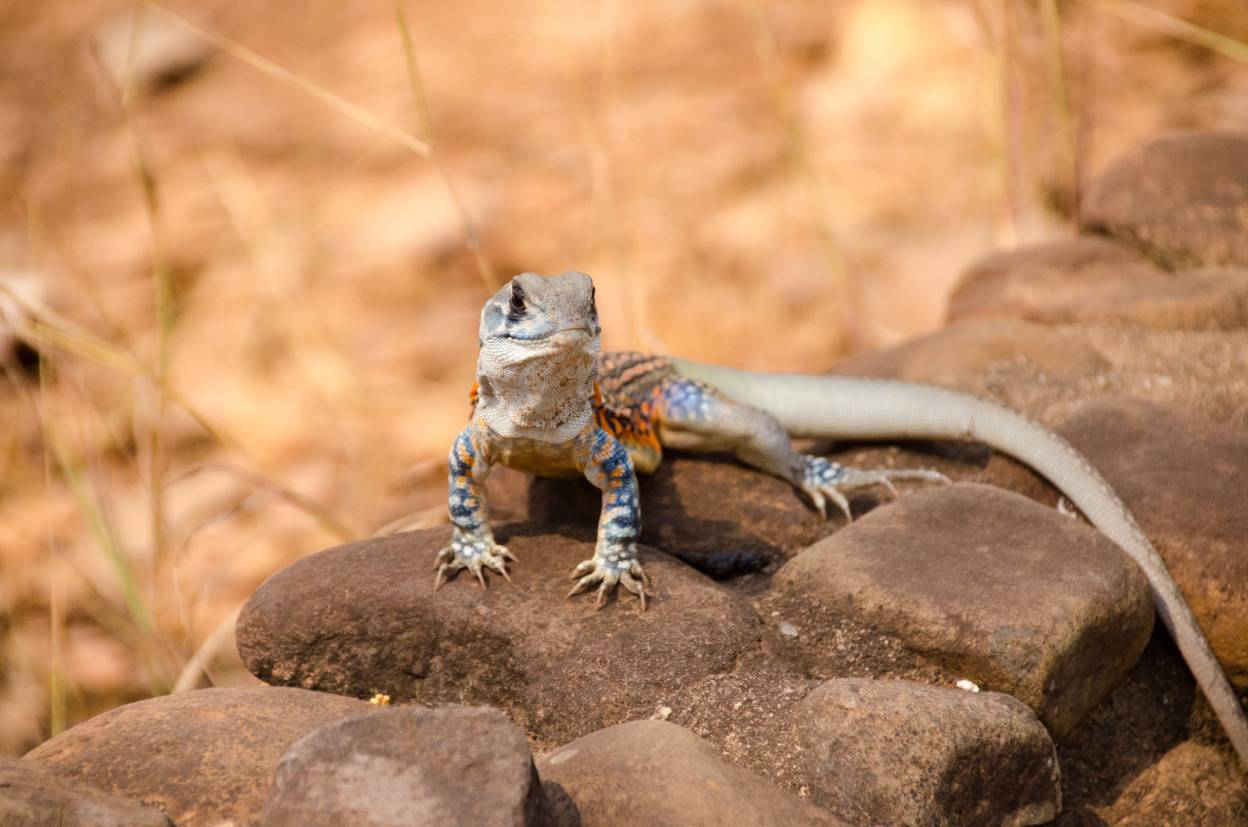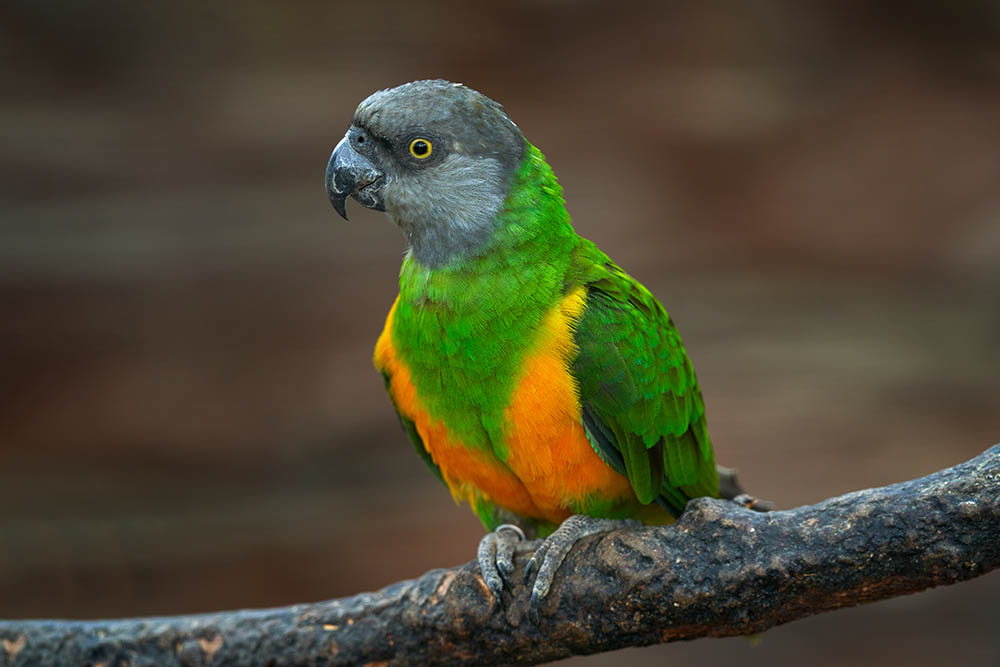Click to Skip Ahead
The Algerian Hedgehog, also known as the North African Hedgehog, is a mammal species native to the Palearctic, an ecosystem encompassing portions of Algeria, Libya, Malta, Morocco, Spain, and Tunisia. There’s not much known about this species, despite the fact that common domesticated breeds result from crossbreeding the Algerian Hedgehog with other hedgehogs. The Algerian Hedgehog is the only species that inhabits areas outside of Africa. With a wide habitat range and a stable population, this species is not at risk in the wild or in a domesticated capacity.

Quick Facts About the Algerian Hedgehog
| Species Name: | Atelerix algirus |
| Family: | Erinaceidae |
| Care Level: | Low |
| Temperature: | Ideally between 75 and 85 degrees Fahrenheit |
| Temperament: | Solitary, nocturnal |
| Color Form: | Brown or white |
| Lifespan: | 8 to 10 years |
| Size: | 200–250 millimeters long, 650 grams |
| Diet: | Omnivores |
| Minimum Cage Size: | 2 feet x 3 feet |
| Cage Setup: | Extra space for activity, with a small box or hiding spot |
| Compatibility: | Can co-exist with cats and dogs but won’t make friends; should be kept away from other exotic species |
Algerian Hedgehog Overview
While the Algerian Hedgehog bears a close resemblance to the European Hedgehog, it’s a distinct species. It’s smaller than the European Hedgehog but the largest of all African Hedgehog species. It has a long snout and long legs, making it a fast runner. The Algerian Hedgehog can be distinguished from its relatives by a lack of spines on the crown of its head or the lack of a widow’s peak.
Like most hedgehogs, this species is nocturnal and solitary. The Algerian Hedgehog will curl into a ball and display its spines to ward off predators when it feels threatened.

How Much Do Algerian Hedgehogs Cost?
The average price of a baby Algerian Hedgehog is between $250 and $350. This price can go up or down based on the hedgehog’s color and unique characteristics. Its personality can also change the price. Hedgehogs that are shyer are usually priced lower than those that are friendly. Since Algerian Hedgehogs are popularly kept as pets, they aren’t hard to find. If you’re not picky about color or markings, a pet hedgehog can be obtained for as little as $100.
It’s important to keep in mind that the price of a hedgehog includes more than what the animal itself costs. Here is a quick breakdown of what you should expect for initial expenses:
| Expense | Approximate Cost |
| Hedgehog | $100–$500 |
| Pet carrier | $10–$25 |
| Cage or enclosure | $30–$150 |
| Food bowl | $3–$10 |
| Water bottle | $3–$10 |
| Hut or burrowing place | $5–$15 |
| A heat lamp or heating pad | $20–$35 |
| Cleaning wipes | $3–$10 |
| Cage thermometer | $5–$10 |
| Total Cost: | $179–$765 |

Typical Behavior & Temperament of Algerian Hedgehogs
An Algerian Hedgehog’s primary defense mechanism is its spines. A hedgehog will curl up into a tight ball when it feels threatened, with its spines sticking out. This adaptation means it has few predators in the wild. Its outer spines also provide the animal with protection. Unlike with porcupines, a hedgehog’s spines are firmly rooted into its skin, protecting it from falls.
All species of hedgehogs are nocturnal. They spend their evenings hunting for food and remain burrowed during the day. It’s important to provide hiding or burrowing spaces inside your hedgehog’s enclosure to mimic its natural environment. These animals can be encouraged to adjust their natural activity schedule and be active during the day by adjusting their feeding times.
Hedgehogs are solitary species that are generally anti-social. Overhandling can lead them to be mistrusting. While your pet might not mind being cuddled occasionally, it will roll into a defensive posture when it wants to be left alone. It’s best not to bother it when it does this.
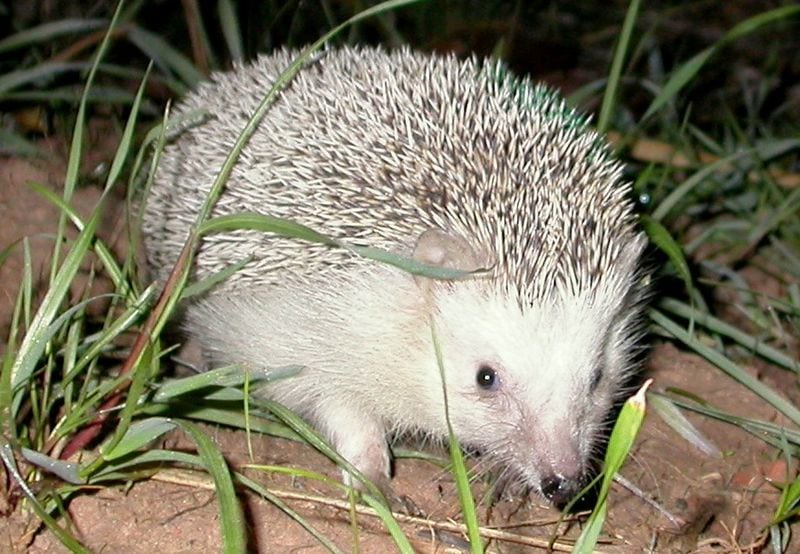
Algerian Hedgehog Appearance & Varieties
A mature adult Algerian Hedgehog measures between 20 and 25 centimeters (7.9 to 9.8 inches) in length and weighs as much as 650 grams.
This species of hedgehog has a light-colored face, often white, and a brown head and brown legs. Their underbelly varies in color but is most often white or brown. Its body is spine-covered and white in color, with darker banding. The lack of spines on the crown of the head is the distinguishing physical feature of the Algerian Hedgehog.

How to Take Care of Algerian Hedgehogs
Habitat, Tank Conditions & Setup
Due to their solitary nature, hedgehogs should be housed alone. Even if you have more than one pet hedgehog, they should live in separate enclosures. Since it’s so active, your Algerian hedgehog will require a floor space that measures at least 2 feet x 3 feet to ensure that it has room to move around.
Hedgehogs are expert escape artists, so make sure their cage has a secure lid. Cages with plastic bottoms and either wire or plastic walls are best. If you choose a wire-walled cage, ensure that the spaces are small enough that your hedgehog can’t fit its head through the bars and become trapped.
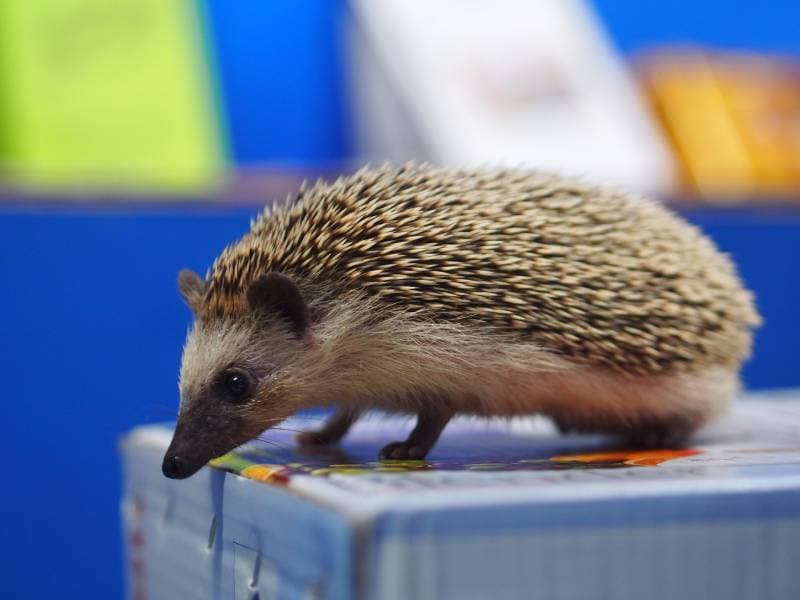
Line the cage with soft, absorbent bedding, such as pine or aspen shavings or recycled and shredded newspaper. Cloth shouldn’t be used inside a hedgehog cage, as these animals have tiny toenails that get caught easily. Hiding spaces are essential. These can be purchased in varying sizes, but you can also use cardboard boxes, flowerpots, or PVC tubing to make a hedgehog shelter.
If you choose to place a wheel in your hedgehog’s cage, use a solid wheel rather than a traditional rodent wheel. The latter can cause severe trauma to the legs and feet of this critter.
Other toys, climbing structures, and even a small swimming tub can be provided to your hedgehog on its daily outings from the cage. These activities should be closely supervised to prevent injury to your pet.

Does the Algerian Hedgehog Get Along With Other Pets?
Hedgehogs aren’t known as aggressive animals, but they will get defensive if their space isn’t respected. While they can learn to co-exist with other pets in the house, it’s unlikely that an Algerian Hedgehog will make friends with them. Even learning to co-habit is dependent on the individual personalities of your hedgehog and your other pets.
Keeping that in mind, there are a few animal species that are more likely to get along with your hedgehog than others:
- Other hedgehogs — Hedgehogs get along well with each other, provided that they are kept in separate enclosures.
- Cats — Cats also tend to be independent and seem to quickly develop a healthy respect for hedgehog spines.
- Dogs — Large prey-driven dogs can quickly injure a hedgehog when playing. Many small dogs quickly learn that the hedgehog has spines and will give it its space.
- Other small animals — These are usually not a problem for hedgehogs. Observe your hedgehog closely when introducing it to other pets. If it exhibits signs of stress during the encounter, remove it from the situation. It may be necessary for it to have “cage-free” time separate from your other animals.
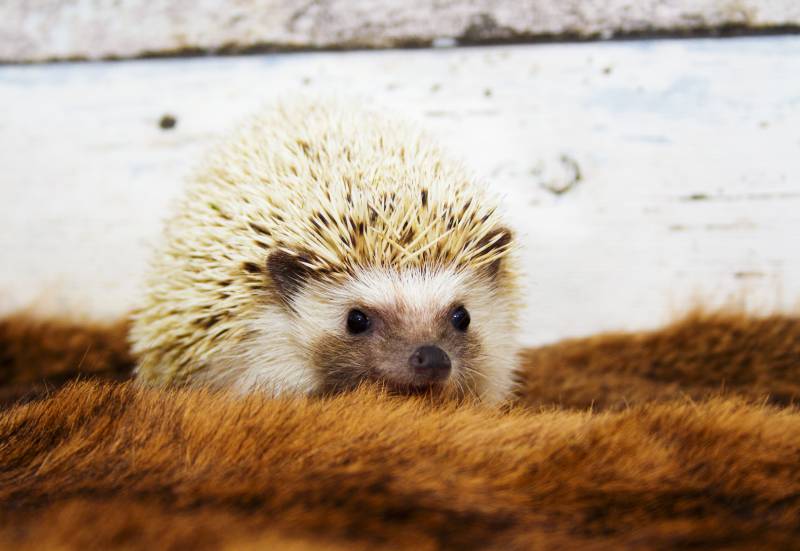

What to Feed Your Algerian Hedgehog
In the wild, hedgehogs primarily feed on invertebrates, but a domesticated hedgehog should be fed a commercial food specifically designed for these animals. Your pet will typically eat 1 to 2 teaspoons of hedgehog food per day and should be fed at specific times. It should never be free-fed because it will quickly become overweight. Cooked meat, egg, or low-fat cottage cheese can also be fed to your Algerian Hedgehog.
pet’s should be fed at dusk, with any uneaten food removed from the cage in the morning. Avoid placing any foods into your hedgehog’s cage that can spoil quickly.
It’s important to provide clean drinking water at all times, with a bowl deep enough to prevent spillage or tipping. However, it should not be so large that your hedgehog can fall in and drown. Provide a sipper bottle too. Once you are certain that your hedgehog is drinking well from the sipper bottle, you can remove the bowl.

Keeping Your Algerian Hedgehog Healthy
Algerian Hedgehogs are sensitive to temperature changes. Their ideal temperature is between 75 and 85 degrees Fahrenheit, though they can tolerate temperatures as high as 90 degrees and as low as 72 degrees. When their environment becomes too hot or cold, hedgehogs go into a hibernation-like state of inactivity.
Illnesses often go undetected due to their nocturnal, solitary nature. Sick hedgehogs also become defensive, making it difficult for their owners to find a problem. You can ensure that your pet remains healthy by having a full physical exam done on them once a year. Subtle changes in eating, drinking, sleeping, and behavior can be signs of illness.
While it isn’t necessary to neuter male hedgehogs, females are prone to developing uterine cancer. This can be avoided by spaying them. Obesity is a serious cause of illness in hedgehogs, so food intake should be carefully controlled. Other common illnesses include skin mites, fleas, and ticks. If you find that your pet is restless, itchy, or biting itself, this may be the cause. Your veterinarian can provide you with medication or special shampoo to help deal with this issue.
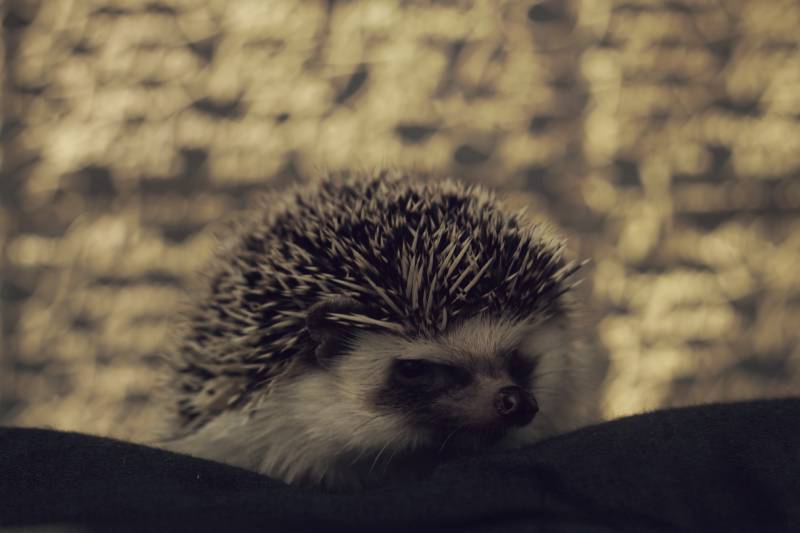
Algerian Hedgehog Breeding
The breeding season of the Algerian Hedgehog runs between October and March. The gestation period is approximately 30 to 40 days, at which times, females can bear litters of three to 10 hoglets. Breeding females can have up to two litters per year.
Hoglets are born blind but gain sight quickly. Spines erupt on hoglets’ backs after about 36 hours. Sexual maturity is reached at 8 to 10 weeks of age. Hedgehogs do not mate for life, and they do not engage in pair bonding.

Are Algerian Hedgehogs Suitable for You?
It’s important to make sure that a hedgehog fits well with your lifestyle before getting one. Here are a few considerations to help you decide if an Algerian Hedgehog is the right fit for you:
- Is it legal to own a hedgehog in your area? While it’s legal in most of the U.S., it is illegal in the states of Pennsylvania, California, Georgia, and Hawaii and in New York City. Some countries of the European Union also have restrictions on owning domestic hedgehogs.
- Do you have small children? While hedgehogs can get along with children, they don’t like handling, and they don’t like noisy environments. While it’s ultimately your decision, hedgehogs may not be the best family pets if you have children under 5 years old.
- Do you want a daytime pet? Hedgehogs are awake and active at all hours of the night and sleep most of the day. Consider your usual daily schedule. If you have an early bedtime, you may not have much time to interact with your pet.
- Are you home in the evening and at night? This is feeding time for hedgehogs. If you work evenings or have an active social life that takes you away from home in the evening hours, this animal may not be for you.
- Do you have enough space in your home? Hedgehogs are small, but they require a large amount of space to be active.
- Do you have the patience to gain their trust? Hedgehogs need their owners to be patient with them, spend time with them, and not force them to interact too soon.
- Can you provide them with daily supervised playtime? This is important for a hedgehog’s physical and social development, but this creature can easily get hurt if not properly supervised.
- Can you tolerate their spines? You will inevitably get poked a few times as a hedgehog owner. You must be able to accept this as part of ownership.
- Can you afford to provide for your hedgehog’s needs? Unlike many other animals, hedgehogs are completely dependent on their human owners to provide for their needs. It’s your responsibility to ensure that your pet is comfortable, healthy, and happy.

Summary
Algerian Hedgehogs are affordable, exotic animals with good temperaments. They are relatively easy to care for, but like any pet, they require a commitment from their owners to give them the care that they need and deserve. Doing your research beforehand will help ensure that you are ready to welcome a beautiful Algerian Hedgehog into your family. Hedgehogs bond with their owners over time and will return affection in a way that can be appreciated.
Featured Image Credit: Best dog photo, Shutterstock
